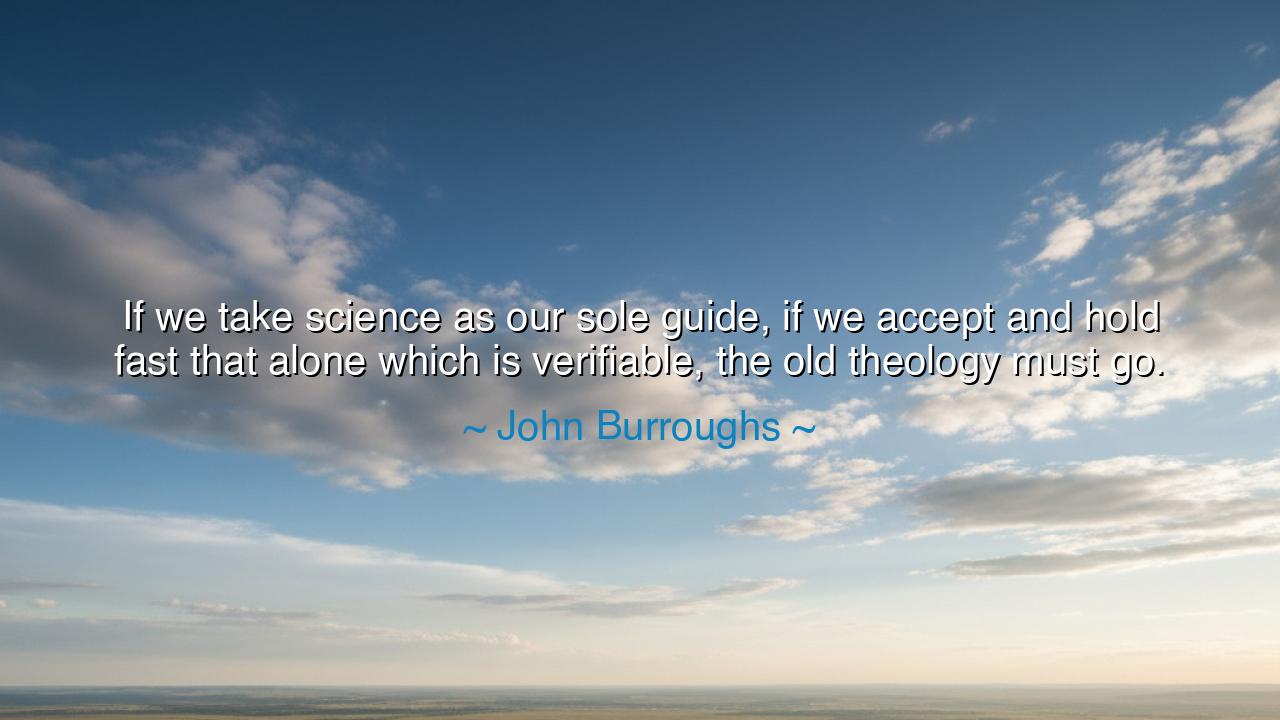
If we take science as our sole guide, if we accept and hold fast
If we take science as our sole guide, if we accept and hold fast that alone which is verifiable, the old theology must go.






In the daring words of John Burroughs, the naturalist-philosopher of the nineteenth century, he proclaimed: “If we take science as our sole guide, if we accept and hold fast that alone which is verifiable, the old theology must go.” These words, forged in the fire of reason and experience, were not the rebellion of an atheist, but the awakening cry of a seeker who revered truth above tradition. Burroughs lived in an age when the old certainties of faith were being challenged by the revelations of science — when the telescope, the microscope, and the mind of man began to uncover mysteries once thought the province of the divine. His statement does not mock faith, but compels it to evolve, to rise from superstition into understanding, from blind obedience into enlightened wonder.
To take science as our sole guide is to walk the path of observation and proof, to seek the light of knowledge through experiment and evidence. Yet such a path demands courage, for it often leads us away from the familiar comfort of inherited beliefs. Burroughs calls this not destruction, but purification — the removal of the veil that prevents us from seeing the universe as it truly is. For when man confines himself to that which is verifiable, he anchors his understanding not in myth, but in the living, breathing fabric of nature. In this, he becomes a student of creation itself, learning from the wind, the stars, and the beating heart of life what no ancient book can fully contain.
But the old theology, Burroughs warns, cannot stand unchallenged in this light. When faith demands blindness and fear, it must yield to the clarity of truth. Yet he does not call for the death of the sacred — only for its rebirth. The gods that were once imagined as distant rulers must now be seen as laws of nature, woven into the cosmos itself. The divine, once clothed in thunder and commandment, now reveals itself through the elegance of physics, the harmony of biology, the order of the stars. In this new theology — a theology of awe rather than authority — man worships not in temples of stone, but in the cathedral of reality.
Consider Galileo Galilei, who stood before the might of the Church and whispered what his heart knew to be true: “And yet it moves.” In that defiance, he embodied Burroughs’ vision — the triumph of the verifiable over the dogmatic. Galileo did not seek to destroy faith, but to liberate it from ignorance. His telescope became the new scripture, his observations the new psalms. Though condemned in his time, history now hails him as one of the prophets of light — a man who trusted truth above approval, and whose courage reshaped the world.
Yet, we must not mistake Burroughs’ wisdom as a cold worship of intellect alone. Science without spirit becomes hollow; knowledge without reverence becomes arrogance. The purpose of casting aside the old theology is not to strip the world of meaning, but to reveal that meaning in its purest form. When we gaze through the lens of discovery, we see that every atom dances with wonder, every law of nature sings of mystery. Science, far from diminishing the sacred, deepens it — for it teaches us that the divine is not elsewhere, but everywhere, immanent in every living thing.
This, then, is the lesson for those who walk in the modern age: seek truth fearlessly, but carry reverence with you. Let your faith be not in creeds, but in curiosity; not in ancient authority, but in the unfolding revelation of existence itself. When you stand before the unknown, do not retreat into superstition, but step forward with humility and wonder. The old theology fades, but in its place rises something grander — a faith not built upon the fear of mystery, but the celebration of it.
So let us honor Burroughs’ wisdom as the ancients honored the voices of the prophets. The age of miracles has not passed; it has only changed its form. The miracle is now the blooming of a flower, the spiral of a galaxy, the pattern of life that connects us all. Hold fast to what is verifiable, but never cease to marvel at what remains unknown. For in that balance — between knowledge and awe, between science and spirit — lies the true path of enlightenment.
And thus, Burroughs’ words echo across the centuries: truth must not fear faith, and faith must not fear truth. The old must fall, yes — but only so that the eternal may rise anew, radiant, unbound, and filled with the living light of understanding.






AAdministratorAdministrator
Welcome, honored guests. Please leave a comment, we will respond soon